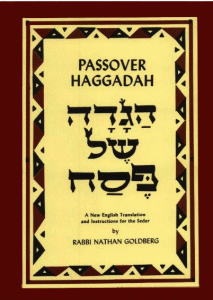 20 “When your son asks you in time to come, ‘What is the meaning of the testimonies and the statutes and the rules that the Lord our God has commanded you?’ 21 then you shall say to your son, ‘We were Pharaoh’s slaves in Egypt. And the Lord brought us out of Egypt with a mighty hand. 22 And the Lord showed signs and wonders, great and grievous, against Egypt and against Pharaoh and all his household, before our eyes. 23 And he brought us out from there, that he might bring us in and give us the land that he swore to give to our fathers. 24 And the Lord commanded us to do all these statutes, to fear the Lord our God, for our good always, that he might preserve us alive, as we are this day.’ 25 And it will be righteousness for us, if we are careful to do all this commandment before the Lord our God, as he has commanded us.
20 “When your son asks you in time to come, ‘What is the meaning of the testimonies and the statutes and the rules that the Lord our God has commanded you?’ 21 then you shall say to your son, ‘We were Pharaoh’s slaves in Egypt. And the Lord brought us out of Egypt with a mighty hand. 22 And the Lord showed signs and wonders, great and grievous, against Egypt and against Pharaoh and all his household, before our eyes. 23 And he brought us out from there, that he might bring us in and give us the land that he swore to give to our fathers. 24 And the Lord commanded us to do all these statutes, to fear the Lord our God, for our good always, that he might preserve us alive, as we are this day.’ 25 And it will be righteousness for us, if we are careful to do all this commandment before the Lord our God, as he has commanded us.
Deuteronomy 6:20-25 (ESV)
Through the millennia, Jews have observed the Passover seder (feast), commemorating their deliverance from bondage in Egypt. Today, many Christian churches reenact this ceremony, but with a difference. They apply it to Christ. Working from Messianic haggadahs (Passover texts), they recite the wonders of God’s deliverance from Egypt and eat the symbolic matzoth, horseradish, egg, and apple. It is all carefully scripted, with precise actions and wording. The ceremonial stipulations are exact—the shank bone of a lamb, an empty chair for Elijah, the father’s questions for the children. There is no free-wheeling discussion, improvisation, or validation of divergent opinions. The message and format are fixed. Both are biblically and educationally important.
In this connection, Deuteronomy 6:20-25 illustrates several principles of religious instruction:
- Historical context is important (vv. 21-22). Those who fail to recognize the handiwork of the Author of history and the debt they owe to their heritage will live prideful, irresponsible lives. And though it is fashionable in academic and political circles to shape history for ideological purposes, God teaches that history is fixed, and only one version is true.
- Memorization is important. While of course there is a time for dispute and dialogue, certain bedrock statements should be committed to memory. Rote memorization of Scripture has fallen on hard times, but both the son’s questions about definite rules (v. 20) and the Lord’s provision of a definite answer (v. 21) show its necessity and vitality.
- Stated purposes are important. The Pharisees, not God, loved rules for the sake of rules. While teachers are not required to give an instant reason for every directive, the students must have confidence that rules are not arbitrary. Rules need good reasons, and these reasons are worth sharing (cf. vv. 23-24). Teachers who press the commands of God without highlighting the beneficent purposes of God do the Lord and their students a grave disservice.
- Theological context is important. False gods surrounded the Israelites, much as religious pluralism and vague spirituality surround contemporary Christians. Teachers must insure that their students understand God’s nature and authority. He it is to whom reverence is due (“the LORD”), who trounces false gods (v. 22), who commits Himself with integrity to men (v. 23), who should be feared (v. 24), and who secures goodness and life for His people (v. 24).
In the Christian Church, catechisms have played a role similar to that of the Passover seder. They too offer precise answers to vital questions. And they have proven to be a treasure on which pastors can draw in shepherding their people toward Christian maturity and articulate service in a world impatient with truth and reverence. In church, as in Moses’ congregation, it is wonderful to have sound, concise, and memorable answers available “when your sons (and daughters) ask.”